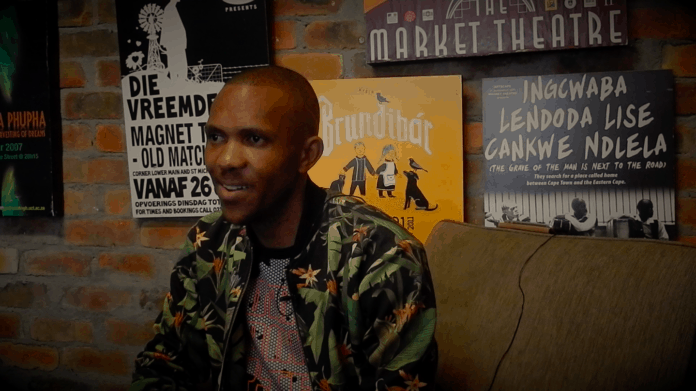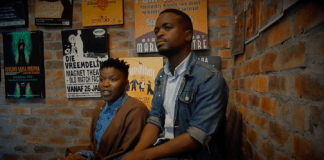LS: My name is Lwanda Sindaphi. I’m from Delft. I am artistic director of Lingua Franca Spoken Word Movement. I graduated in Magnet Theatre in 2013.
LS: I’ve been doing a lot of things […] After I graduated I did War Horse. I was working with Handspring Puppet Company and travelling internationally. We went to Mauritius. We went to Dubai. We went to Switzerland. And I did a couple of poetry shows and I did a festival here with my company, Lingua Franca.

LS: Our vision is to promote and celebrate literature, especially indigenous languages […] when we say indigenous languages, we don’t mean just African languages, even English is an indigenous language to someone […] We want to celebrate […] languages that have been […] historically marginalised, so now we’re trying to bring them back to the surface [… When] people don’t speak their own languages […] they lose, you lose a part of yourself […] We just recently curated a poetry festival called the Naked Word Festival. It was successful. It was sold out, here in Observatory. And that’s something that we got from Magnet because the theme of the festival was ‘I Speak of My Own Inherit-Age’. Not ‘heritage’ but ‘inherit-age’ – the things that we have inherited from our grandmothers, from our grandfathers […] So, we put the two together because we are different cultures and we have to adapt to the present […] Magnet is a lot about migration and roots, so it helps my company.
“Magnet is a lot about migration and roots, so it helps my company”
[…]
LS: They taught us a little bit of business in the Arts so now what I’m trying to do is I’m going to Artscape – my company is part of their incubator programme. They take five companies and they incubate them for a year’s tuition, like [classes in] entrepreneurship. So now I’m trying to combine the two. I gained a lot of knowledge in terms of Theatre [at Magnet] so now I have to combine it with business [skills that I’m learning at Artscape] to benefit economically and artistically.
[…]
LS: When you go to Eastern Cape, you perform rituals, the family sings, you dance, you beat drums. So, when I came here to Magnet that’s what I got […] I was coming back to myself, I was making myself visible because I could not go to Eastern Cape. So, when we’re here […] the way we use images, the way we use objects, […] the training, the knowledge that they give you here allows you to travel […] to the past, and travel back to yourself, to your roots, to your cultural roots, cultivate all of those ancestral senses, ancestral connections […At] Magnet Theatre, that’s what I got … that I was coming back to myself and I can feel that I’m visible to myself. I’m no longer apologetic and, even artistically, I’m not apologetic. I’m using my own images and using my own language, using my own body, my own senses.
“the training, the knowledge that they give you here allows you to travel […] to the past, and travel back to yourself, to your roots, to your cultural roots”
[…]
LS: When they [Magnet] didn’t get funding […] I was like, “No, no this can’t happen”. Because there are people who came to me who, right now, want to go to Magnet because they see what we gained from Magnet so they want to do the same thing.
“you gain a lot of knowledge so that you know that whatever you take in you are going to be able to go back to your community to plan, to try to make the wrongs right”
There is this thing that, when you come here, you see yourself. So, sometimes you look in the mirror and you don’t see yourself, the only thing that you see in the mirror is hopelessness. You see hopelessness … you’re coming from this township and then maybe you went to a poor school, you get taught by poor teachers, and you’re going to come back. That’s what Malcolm X said, that the vicious cycle that you go to the school, you come back to the same community and that’s it […] You become depressed, you don’t know what to do because you don’t know how to improve the community. So, Magnet, it helps us because […] you gain a lot of knowledge so that you know that whatever you take in you are going to be able to go back to your community to plan, to try to make the wrongs right. And then you see yourself and that hopelessness disappears bit by bit. And then you start being visible to your own self and being. And [you’re able to] be proud of yourself and be proud of where you come from […] I was unemployed at times but I always have something to do. And if I’m not writing a story, I’m not waiting for someone to do something for me. I’m always cultivating my own stories because this body […] has many stories. That’s what I love to say, “If you want to come you must come because this building has done a lot for many performers and Theatre makers.”
“this building has done a lot for many performers and Theatre makers”
Please click here to access Dialogue’s other posts in this series of interviews with alumni and staff of Magnet Theatre.
The Full-Time Training and Job Creation Programme receives support from TK Foundation, Rand Merchant Bank, Oppenheimer Memorial Trust, Hosken Consolidated Investments Ltd Foundation, Rolf-Stefan Nussbaum Foundation, Ampersand Foundation, Potjie Foundation, Business Arts South Africa, Western Cape Government Department of Cultural Affairs and Sports Expanded Public Works Programme, Joan St Leger Lindbergh Charitable Trust, and Distell.
Transcribed by Norah Ringma
© Dialogue Community Performance / Magnet Theatre









